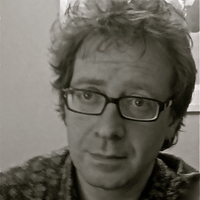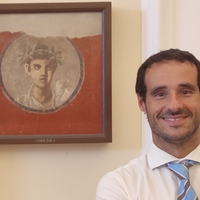
Yasmin Haskell
From 2024: UNESCO Chair in Intercultural and Interreligious Relations, Monash University, Melbourne.
I studied for my doctorate in Latin at the University of Sydney, with a thesis on Renaissance Italian didactic poetry (in Latin and Italian). My honours dissertation (1989) was on the influence of Lucretius in Giordano Bruno.
From 1995 -2003 I was a research fellow in Cambridge, UK, affiliated with the Classics and Modern and Medieval Languages faculties, and with Newnham College.
From 1999-2003 I held a British Academy Postdoctoral Research Award and was hosted by the Department of Italian, University of Cambridge.
I returned to Australia with my young family in 2003 to take up the Cassamarca Foundation Chair in Latin Humanism in Perth, WA. From 2010 I was one of 10 Foundation Chief Investigators of the ARC Centre of Excellence in the History of Emotions in Europe: 1100-1800, leading projects on 'Jesuit Emotions' and 'Passions for Learning'.
From 2017-2018 I was Chair of Latin and Director of the Institute of Greece, Rome and the Classical Tradition, University of Bristol, UK.
I have held visiting fellowships at All Souls and Christ Church Colleges, Oxford, and Trinity College, Cambridge, the Institute of Advanced Studies, Princeton, and am a fellow of the Australian Academy of the Humanities, of the Academia Latinitati Fovendae, and a ‘shepherdess’ of the Academy of Arcadia.
Address: Professor Yasmin Haskell, FAHA
UNESCO Chair in Intercultural and Interreligious Relations
School of Philosophical, Historical and International Studies
Monash University
I studied for my doctorate in Latin at the University of Sydney, with a thesis on Renaissance Italian didactic poetry (in Latin and Italian). My honours dissertation (1989) was on the influence of Lucretius in Giordano Bruno.
From 1995 -2003 I was a research fellow in Cambridge, UK, affiliated with the Classics and Modern and Medieval Languages faculties, and with Newnham College.
From 1999-2003 I held a British Academy Postdoctoral Research Award and was hosted by the Department of Italian, University of Cambridge.
I returned to Australia with my young family in 2003 to take up the Cassamarca Foundation Chair in Latin Humanism in Perth, WA. From 2010 I was one of 10 Foundation Chief Investigators of the ARC Centre of Excellence in the History of Emotions in Europe: 1100-1800, leading projects on 'Jesuit Emotions' and 'Passions for Learning'.
From 2017-2018 I was Chair of Latin and Director of the Institute of Greece, Rome and the Classical Tradition, University of Bristol, UK.
I have held visiting fellowships at All Souls and Christ Church Colleges, Oxford, and Trinity College, Cambridge, the Institute of Advanced Studies, Princeton, and am a fellow of the Australian Academy of the Humanities, of the Academia Latinitati Fovendae, and a ‘shepherdess’ of the Academy of Arcadia.
Address: Professor Yasmin Haskell, FAHA
UNESCO Chair in Intercultural and Interreligious Relations
School of Philosophical, Historical and International Studies
Monash University
less
Related Authors
Desiree Arbo
University of Warwick
Jolanta Rzegocka
Jesuit University Ignatianum in Kraków
Bernhard Huss
Freie Universität Berlin
Valentina Prosperi
Università di Sassari
Marcela Suárez
Universidad de Buenos Aires
Fabio Tutrone
Università degli Studi di Palermo
Henrique Leitão
University of Lisbon
InterestsView All (58)









Uploads
Books by Yasmin Haskell
Papers by Yasmin Haskell
discussion is whether and how different languages and linguistic communities command and transmit different emotional repertories. And what sorts of emotional information are
revealed/ concealed by multilingual writers through the operations of code-switching? Finally, we might consider the emotional investment of certain groups in the use of particular languages or 'epilanguages'.
It is interesting, then, that the printed title of Azevedo’s volume is not, in fact, Tristia, but rather ‘Books of heroic verse’ (Heroum libri) and ‘Letters to heroes’ (Epistolae ad heroas). It comprises a scarcely known four-book epic poem on the return of the Jesuits from the American missions and a collection of ‘Letters to heroes’, again mainly exiled Jesuits, written in a mixture of hexameters and elegiacs. The heroic voice thus competes on several levels in the collection with the Ovidian elegiac/exilic. In this paper I shall introduce Azevedo’s Latin poetry as a vehicle for venting, but also perhaps for suppressing, emotions associated with the personal and collective catastrophe that was the dissolution of the Old Society. The paper will serve as a pilot for a larger project to document the emotions of the Suppression through the lens of neo-Latin literature.
These anxieties of course have a longer history in patristic and scholastic religious texts. Despite his incalculable influence, neither Augustine’s denunciation of curiositas in the Confessions nor his complicated conception of concupiscentia provided the final word on these matters. University theologians and humanists fought passionately for the proprietary rights to Biblical studies in the Renaissance, each accusing the other of ‘putting their sickles into other men’s crops’. The ‘problem’ of the reception of classical learning among religious thinkers in the West was perennial and persistent and continues to provide a fruitful locus for questions in intellectual history.
What is the same and what is different in the understanding of ‘passions for learning’ across this long trajectory? Our symposium will explore and calibrate the various orientations to learning of different faiths and confessions in the medieval and early modern periods; the role that scholars of different faiths assigned to the role of the emotions in learning; and the emotional lives of scholars in the shadow of religion.
Dipartimento di Studi letterari, filosofici e di storia dell’arte
EARLY MODERN AND MODERN COMMENTARIES ON VIRGIL
June 14-16, 2021
An Online Conference
Link Zoom: https://us02web.zoom.us/j/81909339883
All times are CEST (Rome time).
For more information: casali@uniroma2.it
Monday, June 14, 2pm-2:20pm
Welcoming words by EMORE PAOLI (Director of the Department of Studi letterari, filosofici e di storia dell’arte, Università di Roma “Tor Vergata”) and introduction by SERGIO CASALI
SESSION 1
Monday, June 14, 2:20pm-5pm
Chair: VIRGILIO COSTA (Università di Roma “Tor Vergata”)
DAVID WILSON-OKAMURA (East Carolina University)
Afterimages of Lucretius
FABIO STOK (Università di Roma “Tor Vergata”)
Commenting on Virgil in the 15th Century: from Barzizza (?) to Parrasio (?)-I
GIANCARLO ABBAMONTE (Università di Napoli Federico II)
Commenting on Virgil in the 15th Century: from Barzizza (?) to Parrasio (?)-II
NICOLA LANZARONE (Università di Salerno)
Il commento di Pomponio Leto all’Eneide: sondaggi relativi ad Aen. 1 e 2
5pm-5:20pm
Break
SESSION 2
Monday, June 14, 5:20pm-8pm
Chair: EMANUELE DETTORI (Università di Roma “Tor Vergata”)
PETER KNOX (Case Western Reserve University)
What if Poliziano Had Written a Commentary on Virgil?
PAUL WHITE (University of Leeds)
Badius’s Virgil Commentary in the Context of Humanist Education
ANDREA CUCCHIARELLI (Sapienza Università di Roma)
Petrus Nannius as an Interpreter of Virgil: the Commentary on the Eclogues
SERGIO CASALI (Università di Roma “Tor Vergata”)
Petrus Nannius as an Interpreter of Virgil: the Commentary on Aeneid 4
SESSION 3
Tuesday, June 15, 2pm-4:40pm
Chair: JOHN F. MILLER (University of Virginia)
CRAIG KALLENDORF (Texas A&M University)
Virgil’s Unluckiest Commentator? Iodocus Willichius and His Times
FEDERICA BESSONE (Università di Torino)
Spiegare Virgilio con i suoi successori. I commenti virgiliani sulle tracce di Stazio
VIOLA STARNONE (Scuola Superiore Meridionale)
The Metamorphoses of Virgil: Early Modern Responses
VASSILIKI PANOUSSI (College of William & Mary)
Egypt and Africa in the Early Modern Commentaries
4:40pm-5pm
Break
SESSION 4
Tuesday, June 15, 5pm-7:40pm
Chair: IRENE PEIRANO GARRISON (Harvard University)
UTE TISCHER (Universität Leipzig)
Author Strategies in Collected Editions of Printed Commentaries on Virgil in Early Modern and Modern Times
JOSEPH FARRELL (University of Pennsylvania)
Rediscovering the Rediscovery of Homer in Vergil Commentaries, Half a Century On
MONIQUE BOUQUET (Université de Rennes 2 - CELLAM)
La Poétique d’Aristote comme clé de lecture de l’Énéide de Virgile dans les In librum Aristotelis de arte poetica explicationes de Francesco Robortello
PHILIP HARDIE (University of Cambridge)
MetaVirgilian Commentaries, with Particular Reference to Abraham Cowley
SESSION 5
Wednesday, June 16, 2pm-4:40pm
Chair: BARBARA WEIDEN BOYD (Bowdoin College)
YASMIN HASKELL (University of Western Australia)
Virgil Vindicated: Jesuit Praelections, Prolusions, Corrections and Exclusions
GIAN BIAGIO CONTE (Scuola Normale Superiore, Pisa)
Considerazioni sul Commentario a Virgilio di C. G. Heyne
RICHARD F. THOMAS (Harvard University)
Between Heyne and Conington from the Land of the Fairies: Thomas Keightley’s Eclogues and Georgics
STEPHEN HARRISON (University of Oxford)
Victorian Virgil: John Conington and Henry Nettleship’s Commentary (1858-82)
4:40pm-5pm
Break
SESSION 6
Wednesday, June 16, 5pm-7:40pm
Chair: SHADI BARTSCH (University of Chicago)
ALISON KEITH (University of Toronto)
Epicureana in Virgil Commentaries
LUIGI GALASSO (Università Cattolica del Sacro Cuore, Milano)
Su cosa si fonda l’Oltretomba. La dialettica commento-saggio da Norden a oggi
ALEXANDER ROGUINSKY (Russian State University for the Humanities, Moscow) & MIKHAIL SHUMILIN (Russian Presidential Academy of National Economy and Public Administration, / A.M. Gorky Institute of World Literature of the Russian Academy of Sciences / National Research University Higher School of Economics, Moscow) Textual Criticism in Russian Language Commentaries on Classical Latin Poetry: The Case of Valery Bryusov’s Projected Commentary on Aeneid 2
JAMES O’HARA (University of North Carolina)
Adventures in Writing and Editing a Group Classroom Commentary: the Focus-Hackett Aeneid Project